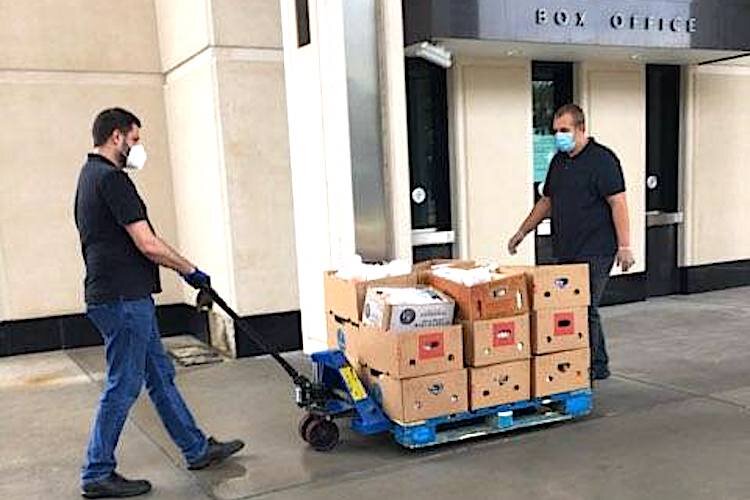With schools closed, community steps up to feed hungry kids
Janan Talafer | 83 Degrees Media
May 19, 2020

On Monday morning, at the height of the torrential storm surging through Tampa Bay, three Pinellas County School buses pulled into the parking garage of the Mahaffey Theater in downtown St. Petersburg.
Volunteers, masked and gloved due to the coronavirus pandemic, began bringing out palettes filled with boxes loaded with healthy meals and snacks for children and families in need.
Over the weekend, the lobby of the theater, closed because of stay-at-home regulations, had been turned into a food-packaging site — a staging area for Meals on Wheels for Kids, a new program launched by the nonprofit Tampa Bay Network to End Hunger.
“Our goal is to fill a gap and help struggling families and children, and we’ll continue to do that until school opens up,” says Caitlin Peacock, executive director of Tampa Bay Network to End Hunger.
About 55,000 children in Pinellas County receive low-cost or free lunches through National School Program, says Peacock. But with schools closed, that service was no longer available. While there are other emergency food distribution sites at community centers, libraries, and YMCAs, as well as food pantries, not all families can get to them.
“A family may not have a car or the head of household may be chronically ill or have too many small children at home to be able to walk to a distribution site,” says Peacock.
Tampa Bay Network To End Hunger had already identified a need for a program that would allow an alternative option for children during spring break and summer vacation. But with COVID-19, the need became even more urgent. “We thought, we have got to launch tomorrow,” says Peacock.
Working in partnership with Share Our Strength’s No Kids Hungry, Pinellas County Schools Food and Nutrition, Daystar Life Center and the Juvenile Welfare Board of Pinellas County, as well as the Foundation for A Healthy St. Petersburg, Tampa Bay Network To End Hunger launched the first-ever Meals on Wheels for Kids on March 23.
The program is now serving about 550 children or 25,000 meals per week. The meals are delivered directly to the children’s home, similar to the long-standing Meals on Wheels program for seniors. But rather than volunteers driving to each recipient’s home using his or her own car, the food is delivered by school buses between 10 a.m. and 2 p.m. Two Meals on Wheels volunteers accompany each school bus.
“The boxes are too large to fit into a typical car,” says Peacock. “We are giving families a week’s worth of food items — enough for five to seven family-style healthy meals, along with frozen items and produce. One of our volunteers was a bus driver and suggested we use school buses. We thought this was a fantastic idea and the school system supported that idea. “
In April, the program got another boost when Bill Edwards, a St. Petersburg entrepreneur, donated $100,000 through the Edwards Family Foundation. The former owner of the Tampa Bay Rowdies, Edwards manages the Mahaffey Theater under a long-term contract with the city.
“Bill recognized that with school closed, there might be a gap in children receiving free lunch every day. He said, ‘I want to do something to feed hungry children’,“ says Amy Miller, Executive Director of the Edwards Foundation For The Arts, the fundraising arm of the Mahaffey Theater.
In addition to his gift to expand the number of meals delivered to area children, Edwards agreed when Miller suggested using the lobby of the theater, closed during the coronavirus, as a food distributing staging site for the program.
“It became this cool trifecta with all of us — the Edwards Family Foundation, The Mahaffey Theater staff, and the Edwards Foundation For The Arts — all coming together to help make this happen,” says Miller. “We’ll continue to do this as long as we can.”
In addition to the Mahaffey Theater, Daystar Life Center and Clearview United Methodist Church in St. Petersburg, as well as the Catherine A. Hickman Theater in Gulfport are serving as weekly food distribution staging sites, enabling the program to reach an even broader group of children in both St. Petersburg and Gulfport.
The program currently serves St. Petersburg zip codes 33701, 33703, 33704, 33705, 33707, 33708, 33709, 33710, 33711, 33712, 33713 and 33714, and is expected to expand to include neighboring zip codes.
“Support from our community is critical during this difficult time,” Peacock said in a press statement. “Our new partners will allow us to provide a much-needed service by distributing more meals to children that are at home and unable to access an emergency feeding site. They will also allow us to bring together community members to volunteer their time to help prepare the food that will be delivered.”
According to the Tampa Bay Network To End Hunger Meals on Wheels For Kids website, more than 75 volunteers are needed each week to assist with packing over bags of food and riding along on school buses to assist with meal delivery.
For more information, to make a donation, or to assist as a volunteer with meal packaging and distribution, go to the Network to End Hunger website.
To view the full news story by 83 Degrees Media, visit https://www.83degreesmedia.com/forgood/community-groups-unite-to-feed-hungry-kids-in-Tampa-Bay-051920.aspx
